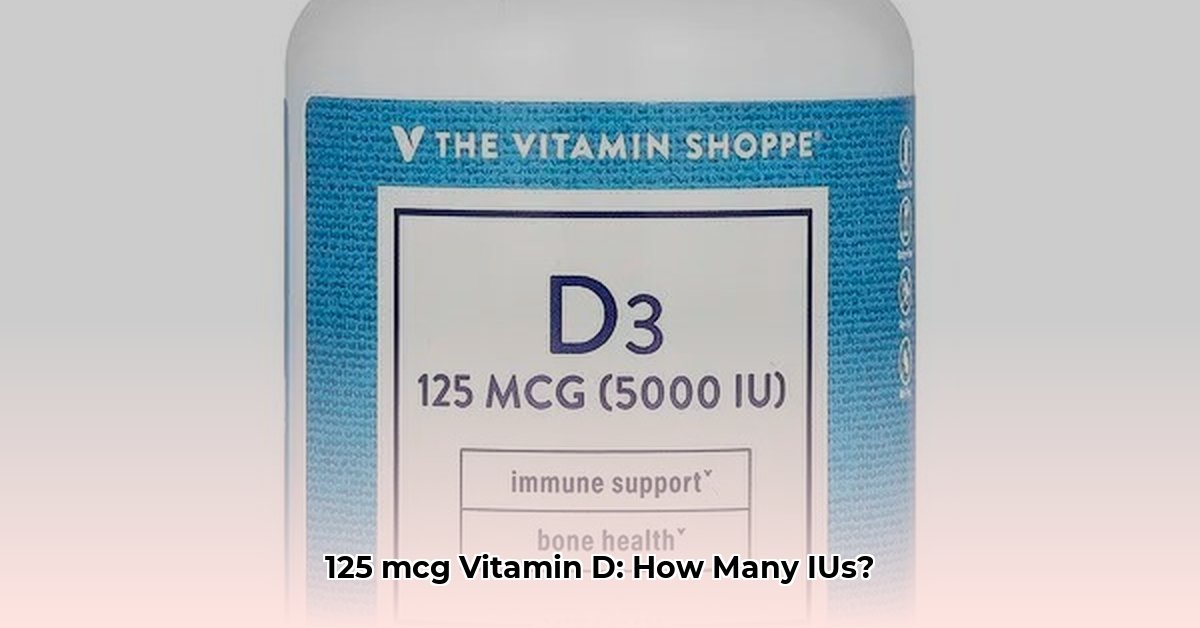5000 IU
125 mcg of vitamin D3 is equivalent to 5000 IU. This conversion uses the factor 40 IU per mcg (125 mcg x 40 IU/mcg = 5000 IU). However, it’s crucial to distinguish between vitamin D2 (ergocalciferol) and D3 (cholecalciferol), as they have different conversion factors.
Understanding mcg and IU
Micrograms (mcg) and International Units (IU) are both units of measurement, but they represent different properties:
-
mcg (micrograms): A unit of weight. It tells you the mass of the vitamin present. Think of it like measuring flour for baking – it tells you how much you have.
-
IU (International Units): A unit of biological activity. It tells you the potency or effectiveness of the vitamin in the body. Like comparing a shot of espresso to a large, weak coffee – both are coffee, but their strengths are vastly different.
Vitamin D2 vs. D3: Different Conversions
The 40 IU/mcg conversion applies specifically to vitamin D3, the form your body naturally produces from sunlight exposure. Vitamin D2, derived from plant sources, has a different conversion factor: 100 IU/mcg. Therefore, 125 mcg of vitamin D2 equals 12,500 IU. While both contribute to your overall vitamin D levels, ongoing research suggests D3 might offer superior bioavailability and efficacy in some cases. This potential difference highlights the importance of knowing which form you’re taking.
Vitamin D Conversion Table
Here’s a quick-reference table for common vitamin D conversions:
| Vitamin D Type | mcg | IU |
|---|---|---|
| D3 | 25 mcg | 1000 IU |
| D3 | 50 mcg | 2000 IU |
| D3 | 125 mcg | 5000 IU |
| D2 | 25 mcg | 2500 IU |
| D2 | 50 mcg | 5000 IU |
| D2 | 125 mcg | 12,500 IU |
Why Accurate Conversion Matters
Accurate conversion is vital for appropriate dosing. Too little vitamin D can negatively impact bone health, immune function, and mood, while excessive intake may cause nausea, vomiting, and other health problems. Getting the right amount is crucial.
Importance of Professional Guidance
While this information provides a general understanding, it should not substitute advice from a healthcare professional. Factors like age, diet, sun exposure, and individual health conditions influence your vitamin D requirements. A healthcare provider can assess your specific needs, perform blood tests to measure your current levels, and recommend the correct dosage and form of vitamin D for you.
Disclaimer: This information is for educational purposes only and is not a substitute for professional medical advice. Always consult with a qualified healthcare provider before starting any new supplement or making changes to your existing medication or supplement regimen.
- Meal Prep Delivery Brings Convenient, Healthy Meals to Your Door - January 1, 2026
- Bento Box Stackable Lunch Solutions For Organized Daily Meals - December 31, 2025
- Stacked Bento Box Design Keeps Your Meals Organized and Fresh - December 30, 2025










